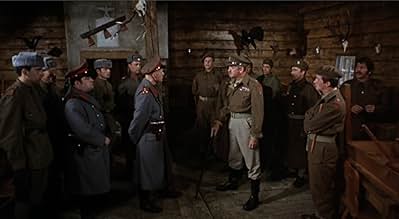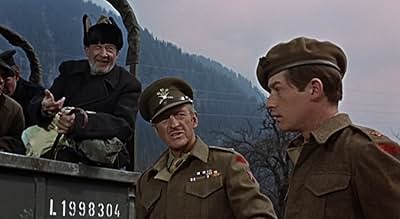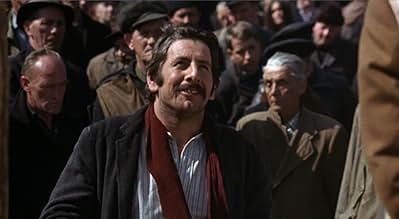After World War II, in an Austrian camp for displaced people, an interpreter mediates between the British and the Soviets regarding the fate of various refugees.After World War II, in an Austrian camp for displaced people, an interpreter mediates between the British and the Soviets regarding the fate of various refugees.After World War II, in an Austrian camp for displaced people, an interpreter mediates between the British and the Soviets regarding the fate of various refugees.
Hana Maria Pravda
- Beata
- (as Hana-Maria Pravda)
- Director
- Writers
- All cast & crew
- Production, box office & more at IMDbPro
Featured reviews
This isn't really a comedy, despite it's billing in TV guides and some boisterous parts in the first half of the film. It is really a drama that tries to tell a story about different characters trying to make the best of their circumstances, amidst the near-chaos of post-war eastern Europe.
The backdrop and the sub-text of the film is that this is the preamble before the 'winter' of the cold war sets in; an unhappy state of affairs that suits no-one.
There is a fine cast in this film and it is mostly well-made. The camerawork uses a fair amount of the (then novel) zoom lens which is a little distracting, but not as distracting as some hand-held camerawork; an early example of 'shaky camera' for effect. Yeah, we get the point after ten seconds, we don't have to made ill by watching this for several more minutes, do we...?
If asked to criticise the casting and the acting performances, I can't help but think that Niven plays it a bit too straight, and that say, (a younger) Alec Guinness might have done a better job of it. But I am quibbling really; this is a pretty good film, well worth watching.
The backdrop and the sub-text of the film is that this is the preamble before the 'winter' of the cold war sets in; an unhappy state of affairs that suits no-one.
There is a fine cast in this film and it is mostly well-made. The camerawork uses a fair amount of the (then novel) zoom lens which is a little distracting, but not as distracting as some hand-held camerawork; an early example of 'shaky camera' for effect. Yeah, we get the point after ten seconds, we don't have to made ill by watching this for several more minutes, do we...?
If asked to criticise the casting and the acting performances, I can't help but think that Niven plays it a bit too straight, and that say, (a younger) Alec Guinness might have done a better job of it. But I am quibbling really; this is a pretty good film, well worth watching.
David Niven makes a very remarkable performance here as an unwilling soldier in charge of a refugee camp (in the times of 4 million displaced persons in Europe) in Austria, where he has to send many paperless refugees into the Russian zone, where they have nothing good to expect in the days of big brother Stalin. He has a sore past that aches, but as a major in charge he has to stick to his stiff uppper lip, no matter what difficult trials he has to go through again. Topol makes a brilliant performance as the multí-lingual interpreter with many tricks up his sleeve, born in a cart between Tiflis and Tashkent, and he makes the best of it and is thoroughly entertaining, until the bleak reality of no peace after a war sets in, This is really a tragedy of several deep bottoms, and although David Niven is already thoroughly disíllusioned and Topol already is acquainted with the worst and has learned the hard way to survive, John Hurt as the young greenhorn still has his disillusions ahead of him, and they will strike him hard. Fortunately there is Anna Karina for a well needed sort of comfort to all of them.
The film is more serious than it seems, it tries to appear like a comedy, and there certainly are comic ingredients, but the comic gloss cannot hide or smooth over the cruelty of the reality.
Although the dark side of the Stalin regime should have been universally known to the world already after the Stalin trials of 1936, the west was amazingly naïve about Stalin and the true nature of his "communist paradise", as Roosevelt allowed himself to be duped by him and Churchill actually believed in him - until the cold war was a blatant fact, some time after the peace of the second world war, which never really ended but only took on less obvious inhuman activities of darkness.
After watching Before Winter Comes I'm still trying to figure out the points it was trying to make and where was the humor. Such laughs it had are the grimly ironical kind. As a vehicle for Topol it was quite good for that.
David Niven was playing it serious for once. He plays a British army major who for trying a grandstand play during battle got a whole lot of soldiers killed. Now that World War II is over he's in charge of a displaced refugee camp. Under the strict guidelines set by Yalta he has some rigid instructions as to where to send refugees. No one wants to go to the Russian zone, but that's not his call.
As for Topol when the call goes out for camp interpreter Topol is ready to make himself useful. In fact he's almost too good to be true. Probably he is.
In this film that seems rather pointless Topol is the whole show. A bit of his Tevye from Fiddler On The Roof is here, but his character is more like something Danny Kaye might have done. The script doesn't help Topol, he has to mine some barren land for some laughs.
Niven is not his usual charming self trying to carry a film on that. His character doesn't permit charm. He's in a situation he hates and wants to go back to 'fighting' regiment. But that says Brigadier Anthony Quayle ain't about to happen.
As a vehicle for Topol he proves he can play something other than Tevye, like Yul Brynner being someone other than the King of Siam. But the film really sinks into a bog of pretension in the final analysis.
David Niven was playing it serious for once. He plays a British army major who for trying a grandstand play during battle got a whole lot of soldiers killed. Now that World War II is over he's in charge of a displaced refugee camp. Under the strict guidelines set by Yalta he has some rigid instructions as to where to send refugees. No one wants to go to the Russian zone, but that's not his call.
As for Topol when the call goes out for camp interpreter Topol is ready to make himself useful. In fact he's almost too good to be true. Probably he is.
In this film that seems rather pointless Topol is the whole show. A bit of his Tevye from Fiddler On The Roof is here, but his character is more like something Danny Kaye might have done. The script doesn't help Topol, he has to mine some barren land for some laughs.
Niven is not his usual charming self trying to carry a film on that. His character doesn't permit charm. He's in a situation he hates and wants to go back to 'fighting' regiment. But that says Brigadier Anthony Quayle ain't about to happen.
As a vehicle for Topol he proves he can play something other than Tevye, like Yul Brynner being someone other than the King of Siam. But the film really sinks into a bog of pretension in the final analysis.
This starts out as a rather tongue-in-cheek rendering of life in a camp for displaced persons after the war in 1945 somewhere near the Austrian border. There are many humorous incidents but eventually the film's message does get serious later on.
I'm amazed at the abundance of illustrious actors making up the cast -- David Niven as Major Burnside; Topol as the effusive interpreter; John Hurt playing the youthful but intense Lieutenant Pilkington; and Anthony Quayle as Brigadier Bewley.
There are moments of deep friction in the camp between British and Russian troops on various zoning matters including the fate of the interpreter who happens to be Russian.
Although there is a fair amount of drama and mature content throughout, I have the impression that this film has been an easy interlude for all these great, serious actors. Anna Karina as Maria the local girl is a lovely addition to the cast.
The scenery is fabulous of course, being filmed on location in Austria. It is somewhat of an offbeat script, however it does hold one's attention through to the end. This movie is one I missed out on all these years so am glad to have had to opportunity to finally see it. For me such good actors can't help but create an absorbing drama.
I'm amazed at the abundance of illustrious actors making up the cast -- David Niven as Major Burnside; Topol as the effusive interpreter; John Hurt playing the youthful but intense Lieutenant Pilkington; and Anthony Quayle as Brigadier Bewley.
There are moments of deep friction in the camp between British and Russian troops on various zoning matters including the fate of the interpreter who happens to be Russian.
Although there is a fair amount of drama and mature content throughout, I have the impression that this film has been an easy interlude for all these great, serious actors. Anna Karina as Maria the local girl is a lovely addition to the cast.
The scenery is fabulous of course, being filmed on location in Austria. It is somewhat of an offbeat script, however it does hold one's attention through to the end. This movie is one I missed out on all these years so am glad to have had to opportunity to finally see it. For me such good actors can't help but create an absorbing drama.
Following the abysmal 'Eye of the Devil' J. Lee Thompson and David Niven have teamed up again for ths film set in a displacement camp. Faced with a veritable Tower of Babel the commanding officer Major Burnside is sorely in need of an interpreter but is sent someone who knows only Ancient Greek and Latin. Luckily he stumbles upon a prisoner who is multi-lingual. Burnside turns a blind eye to his probably being a deserter but then his Russian counterpart starts to ask questions.......
Music can make or mar a film and the score by Ron Grainer is terminally irritating. The scenes between the Cockney and Russkie soldiers are decidedly naff. As for the principals Topol is okay as the interpreter but his appeal has always eluded me. Anna Karina's talent and beauty transcend a thankless role and Anthony Quayle is brilliant as a Brigadier who calls to mind Peter Ustinov's observation that 'the Army is the final repository of the fool'. The film really belongs to Niven. It is not at all unusual to see him in uniform but behind his character's military persona there is a resignation and world-weariness which is very touching. Decidedly one of his best post-Oscar performances. This film should have been better but is alas another of this directors near misses.
Did you know
- TriviaAlysoun Austin's feature-film debut, playing the role of "A.T.S. Driver."
- GoofsThe John Hurt character (Lieutenant Pilkington) has long hair, like John Lennon, not in keeping with British army regulations.
- Quotes
Major Burnside: What languages do you speak?
Janovic: Russian, Polish, Greek, Hungarian, German, Romanian, Bulgar, Serbo-Croat, Romani, Italian, some Arabic, some Yiddish, a little Chinese.
- Crazy creditsOpening credits prologue: OCCUPIED AUSTRIA SPRING, 1945
- How long is Before Winter Comes?Powered by Alexa
Details
- Runtime
- 1h 43m(103 min)
- Aspect ratio
- 1.85 : 1
Contribute to this page
Suggest an edit or add missing content





































